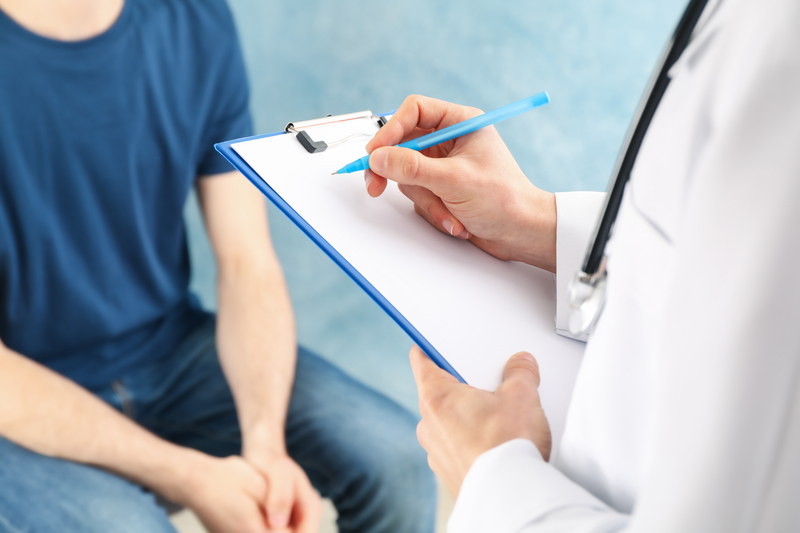General Health
The Functions of the Prostate Gland and the Potential Disorders
Share to

Table of Contents
The prostate gland is an organ that plays a vital role in the male reproductive system. This organ is located in the pelvis, particularly below the bladder. The disrupted function of the prostate gland may risk triggering health disorders and fertility issues in men.
To prevent those issues, it is crucial for men to increase their awareness about the functions of the prostate gland and how to maintain its health, as explained in the following article.
Anatomy of the Prostate Gland
The prostate gland is located below the bladder and surrounds the urinary tract and the channel through which urine and sperm exit from the body. This walnut-shaped organ is only found in men and can enlarge with age.
The structure of the prostate gland is divided into four main zones. More details on each zone in the prostate glands from the outermost to the innermost are as follows.
1. The Anterior Fibromuscular Stroma
The outermost zone of the prostate is composed of muscular and fibrous tissues. This zone is part of the fibromuscular capsule, which surrounds the prostate gland.
2. The Peripheral Zone
The peripheral zone takes up 70% of the prostate gland tissue. The peripheral zone is the area that the doctor can palpate during a digital rectal exam (DRE).
The peripheral zone is where health disorders, such as prostate adenocarcinoma, often occur. It is also the most frequent site of inflammation (prostatitis) or chronic infection.
3. The Central Zone
The central zone is also known as the middle lobe. This part surrounds the transitional zone and accounts for about 25% of the prostate gland’s overall weight. The central zone also contains several parts, including seminal vesicles, ejaculatory ducts, and prostatic ducts.
4. The Transitional Zone
The transitional zone is the innermost and tiniest part of the prostate gland, comprising only about 10% of the prostate gland’s total weight. The transitional zone surrounds the upper third of the urethra.
The transitional zone in the prostate gland is the only organ that continues to grow throughout life. Therefore, this zone tends to be the starting point for the development of benign prostate hyperplasia (BPH).
The Functions of the Prostate Gland
What are the functions of the prostate gland? The prostate gland is responsible for the male reproductive system and fertility. The prostate gland produces semen and hormones, regulates urine flow, and performs many other functions.
More details on the functions of the prostate gland are as follows.
1. Producing Semen
One of the functions of the prostate gland in the male reproductive system is to assist the testes in producing alkaline fluid that contains sperm cells. This fluid then forms semen and is released during ejaculation.
Semen has antibodies that protect the sperm and the urinary system from disease-causing bacteria. This fluid is also responsible for nourishing sperm cells, allowing them to move effectively within the female uterus to achieve fertilization.
2. Helping to Pump Sperm
In addition to producing semen, another function of the prostate gland is to help pump sperm during sexual intercourse. This allows the sperm to travel farther and survive longer in the uterus to fertilize the egg.
3. Creating an Erection
The prostate gland becomes one of the male G-spots, a sensitive area located in the genital region. Therefore, the prostate gland can create and maintain an erection during sexual intercourse.
4. Producing PSA Enzymes
The next function of the prostate gland is to produce an enzyme called prostate-specific antigen (PSA). This enzyme helps liquify semen after ejaculation, allowing sperm cells to move freely to the ovum.
However, if the prostate gland produces PSA enzyme in excess, it may indicate prostate cancer. Therefore, it is advisable for men to check their PSA levels regularly.
5. Controlling Urine Flow
Controlling urine flow in the urinary tract is also one of the functions of the prostate gland, ensuring the urine does not mix with semen during ejaculation.
Another function of the prostate gland is to prevent urinary tract infections. During the secretion, the prostate can help protect the urinary tract from bacteria or other pathogens that can cause infections in the urethra.
6. Supporting Male Hormones
The prostate gland can also support the activity of testosterone in men. Additionally, it contributes to the production of DHT (dihydrotestosterone) hormones that stimulate sexual drive in men.
Disorders of the Prostate Gland
Several disorders or medical conditions that can affect the functions of the prostate gland include:
1. BPH
BPH (benign prostate hyperplasia) or enlargement of the prostate is a condition in which the prostate gland enlarges, but not caused by cancer. This enlargement may compress the urinary tract and cause the bladder to thicken, thereby hindering urination.
2. Prostatitis
Prostatitis is inflammation of the prostate gland that may be caused by infections. This condition is typically triggered by urinary tract infections or sexually transmitted diseases. Prostatitis is often found in men between 30 and 50 years old or men with weakened immune systems.
3. Prostate Cancer
Prostate cancer is one of the types of cancer that men should watch out for. This condition occurs when cells in the prostate gland grow abnormally. However, the exact cause of prostate cancer remains unknown.
How to Maintain Healthy Prostate Gland Functions
Several steps that men can take to maintain healthy prostate gland functions include:
-
Consuming healthy foods with balanced nutrition, such as fruits and vegetables.
-
Exercising regularly.
-
Avoiding the excessive consumption of red meat, fatty meat, and foods high in salt.
In addition to adopting the aforementioned healthy lifestyle, you can also undergo a regular medical checkup to prevent prostate cancer or other prostate disorders using the Prostate Cancer Screening MCU package at Siloam Hospitals.
If you have other symptoms, promptly visit the nearest Siloam Hospitals for an accurate diagnosis and proper treatment from our doctors. You can use the Find Doctors feature to browse doctors’ schedules and book an appointment with the relevant doctor. You can also utilize the MySiloam app to consult a doctor online. Let’s maintain your health #TogetherWithSiloam!






